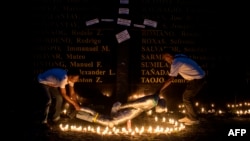Philippine President Rodrigo Duterte enjoys widespread popular support nearly a year into his deadly anti-crime campaign, despite a wall of criticism from abroad over suspected extrajudicial killings.
Eighty percent of Filipinos surveyed in the first quarter of this year placed “much trust” in Duterte, who took office in June on pledges to eradicate crime, especially illegal drugs. The Manila-based research institution Social Weather Stations says the president has received an “excellent” rating in surveys for four quarters. Fellow survey agency Pulse Asia found in March that 79 percent of people polled “approve” of the government’s effort to control crime.
Filipinos often say they feel safer now compared to the period before Duterte, former mayor of the country’s second largest city, took office. The president, known for tough language, said before taking office that he would order police to kill drug suspects.
“I’m happy with the curfew for minors,” said Clarence Miñao, a 37-year-old mother and local government employee in the southern city Cagayan de Oro. “Before there was no implementation of that, so at least now there is. So it’s safer for the kids and also for adults, because during nighttime in the street there (are) a lot of bystanders, so you don’t know if they’re on drugs or doing bad things to you.”
Other Filipinos, including inhabitants of the capital, Manila, say they see drops in violent crime, theft and even illegal traffic maneuvers. Increased policing deters criminals, they say, making urban neighborhoods feel safer.
“I think the reason why criminality is low is because of the fear,” said Antonio Contreras, political scientist at De La Salle University in the Philippines. “President Duterte came in strongly on that, being an anti-criminal.”
Property crimes still rose 6.3 percent in the past quarter, while violent crime and “presence of many drug addicts” held steady, Social Weather Stations found in another survey.
Sentiment in the Philippines clashes with critics abroad, including officials in Europe, the United Nations and leaders in the Catholic Church. The New York-based advocacy group Human Rights Watch, which is also critical of the anti-drug campaign, estimates 7,000 people have died in extrajudicial killings at the hands of police or their agents who are looking for drug dealers.
“In terms of any palpable change or perceived change in safety in the Philippines, the fact is the war on drugs has resulted in the extrajudicial killings of thousands of mostly urban slum dwellers, some of the country’s poorest and most marginalized and vulnerable citizens,” said Deputy Asia Director Phelim Kine.
“And in the areas where those people live, residents live literally in a state of fear, concerned that they too could be the next who are targeted by police or 'unidentified gunmen,' who Human Rights Watch research indicates are police in plain clothes or police agents,” he said.
Philippine officials have acknowledged killings in the course of stopping trade in illegal drugs. Usage rates of shabu, a methamphetamine strain, was higher in the Philippines in 2012 than anywhere else in East Asia, according to the U.N. World Drug Report. But Duterte’s government rejects claims of systematic extrajudicial killings and says foreign critics fail to see progress in easing crime.
Duterte called Barack Obama a “son of a whore” in September, fearing the former U.S. president would lecture him over human rights at an international event, Philippine media said. In December he called the United Nations human rights chief an “idiot.”
On Monday, Philippine Sen. Alan Peter Cayetano told a U.N. Human Rights Council session that his government was not sponsoring a “wave of extrajudicial killings.” Duterte had sent Cayetano to Geneva for a council review of his country. A U.N. special rapporteur visited Manila for a ceremony earlier in the month, but the official, who is critical of Duterte’s anti-drug campaign, declined the president’s offer to debate him.
Police have arrested 64,917 drug “personalities” during more than 53,000 busts so far during Duterte’s term, Cayetano said. Over the previous six years, 93,000 busts were made, he said. People may be killed, he said, when suspects violently resist arrest.
“Some of the critics of the Duterte Administration, including our very own Commission on Human Rights, a senator critic and some local media changed the definition of extra-judicial killings, therefore deceiving the public and foreign media into believing that there’s a sudden wave of state-sponsored extrajudicial killings in the Philippines,” Cayetano told the review session. “This is absolutely not true.”
He asked the Council to interview people in the Philippines rather than accept his view or that of the president’s critics.




